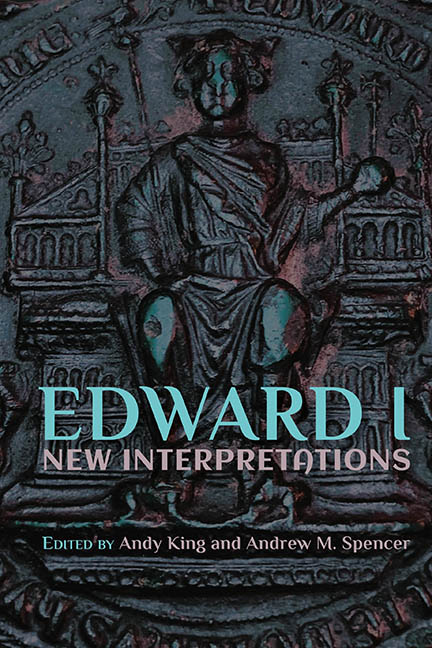Book contents
- Frontmatter
- Contents
- List of Contributors
- Acknowledgments
- Abbreviations
- Genealogy of Edward I
- Introduction
- 1 The Lord Edward and the Administration of Justice across his Apanage, 1254–72
- 2 A Tale of Two Ministers: Robert Burnell, Walter Langton and the Government of Edward I
- 3 Law and Order in the Reign of Edward I: Some New Thoughts
- 4 Magnates, Ritual and Commensality at Royal Assemblies: Bogo de Clare and Edward I’s Easter Parliament, 1285
- 5 Royal Daughters and Diplomacy at the Court of Edward I
- 6 Hearts and Bodies: Edward I and the Scottish Magnates, 1296–1307
- 7 Edward I and the Blessed Virgin Mary
- 8 Letters and Political Discourse under Edward I
- 9 Crisis? What Crisis? 1297 and the Civil War that Never Was
- Index
9 - Crisis? What Crisis? 1297 and the Civil War that Never Was
Published online by Cambridge University Press: 21 March 2020
- Frontmatter
- Contents
- List of Contributors
- Acknowledgments
- Abbreviations
- Genealogy of Edward I
- Introduction
- 1 The Lord Edward and the Administration of Justice across his Apanage, 1254–72
- 2 A Tale of Two Ministers: Robert Burnell, Walter Langton and the Government of Edward I
- 3 Law and Order in the Reign of Edward I: Some New Thoughts
- 4 Magnates, Ritual and Commensality at Royal Assemblies: Bogo de Clare and Edward I’s Easter Parliament, 1285
- 5 Royal Daughters and Diplomacy at the Court of Edward I
- 6 Hearts and Bodies: Edward I and the Scottish Magnates, 1296–1307
- 7 Edward I and the Blessed Virgin Mary
- 8 Letters and Political Discourse under Edward I
- 9 Crisis? What Crisis? 1297 and the Civil War that Never Was
- Index
Summary
IN 1297, the twenty-fifth year of the reign of Edward I, England teetered on the cliff-edge of civil war. Or such is the modern historiographical consensus. Typical are the comments of Michael Prestwich (1988), who refers to ‘near civil war’; Marc Morris (2005): ‘civil war seemed imminent and inevitable’; Paul Brand (2005), who posits ‘the real danger of civil war’; and Andrew M. Spencer (2013) who alludes to ‘a movement that brought England close to civil war’. And this is not a recent development in the historiography of Edward I's reign; in 1875, for instance, William Stubbs, that nonpareil of Whig historians, opined that military forces raised to support the barons ‘gave to the whole proceeding the appearance of a civil war’. But has the danger of civil war in England in 1297 been over-stated?
Such arguments are certainly not implausible: all previous kings of England had faced armed resistance from within the realm at some point during their reign. During the preceding century, the reigns of John (Edward's grandfather) and Henry III (Edward's father) had seen political crises which had ended in full-scale war between the king and his English opponents – with Edward himself a major player in the latter conflict. Similar hostilities would occur in the reign of his son, Edward II. And while royal attitudes to rebellion and treason were hardening in England (and across Western Christendom generally), the notion that a king's subjects had the right to resort to armed force to oppose him, if he proved incorrigibly ill-counselled or tyrannical, was still widely accepted among the English political classes. So why, then, in 1297, did acute political crisis not escalate to armed conflict?
The course of events is well known, having been clearly elucidated by a number of historians. In broad outline, political controversy began in January, with the refusal of the clergy to pay the subsidy of a fifth demanded from them at parliament in the previous November, on the grounds of the recently issued papal bull Clericis laicos, prohibiting the payment of taxes by the Church to secular authorities. Lay opposition erupted in February, at the parliament at Salisbury, where Edward's demands for military service in Gascony met with refusal, led by Roger Bigod, earl of Norfolk, the hereditary marshal of the king's army.
- Type
- Chapter
- Information
- Edward I: New Interpretations , pp. 163 - 184Publisher: Boydell & BrewerPrint publication year: 2020



